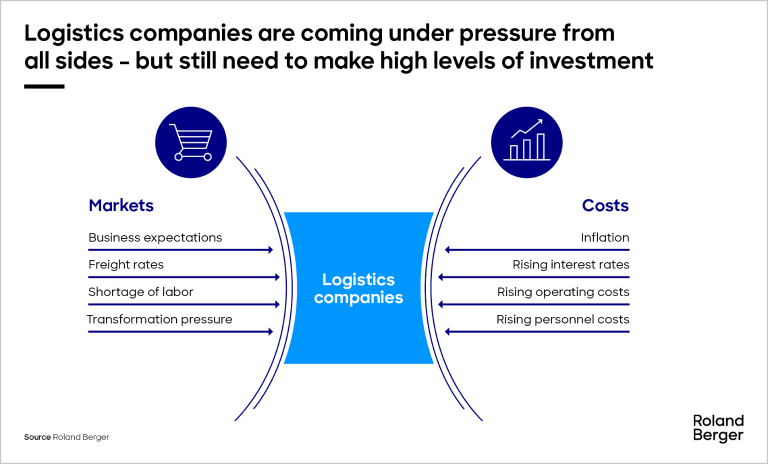Roland Berger supports the mobility and logistics industry in digitization along the entire value chain.


Logistics in the doldrums
How holistic performance improvement can get logistics companies back on the road to success
After an unprecedented boom during the Covid pandemic, the party atmosphere in the logistics industry has turned to something much less cheerful. The signs were all there: The big inventory reduction in the course of Christmas trading 2022/2023 was followed by a drop in transport volumes and freight rates. Supply chains normalized at the same time. Many consumers are now holding back on making purchases, and companies too are expecting a more pessimistic future.

The current crisis is unlikely to be a short-lived slump. The entire logistics industry is facing fundamental challenges. Not only rising costs and falling freight rates are weighing on companies' profitability (EBITDA). Labor shortages and megatrends like digitalization and sustainability are also placing heavy demands on businesses in the sector. Added to that, political requirements such as Germany's Supply Chain Sourcing Obligations Act (LkSG), growing uncertainty and delayed infrastructure projects demand a great deal of flexibility from companies and add a measure of unpredictability to their investment plans.
Because cash flows are literally collapsing owing to falling revenues and simultaneously rising costs, management attention is now focused on ensuring business resilience combined with strong internal financing power.
Holistic performance improvement rather than a one-sided fixation on liquidity
Past profits and a seemingly comfortable liquidity cushion will not be enough for most companies to emerge stronger from the current crisis. What SME logistics and transport companies need now is financial firepower and a comprehensive strategy that creates tangible added value in the short and medium term.
Our holistic performance program therefore scrutinizes all key areas of the company, leaving no stone unturned. Instead of simply proposing cuts, we delve deep into all relevant value creation topics. Starting with a review of the strategy and portfolio, we take a critical look at the core competencies in terms of products, markets and segments and determine where the company stands against industry peers. We also evaluate the current innovation and growth strategy and examine the business from all sides.
Quick wins improve the company's cost and liquidity position in the short term while improving efficiency at the same time. Then, moving through the target aspects of digitalization and sustainability, we ensure that all efforts are aligned towards profitable growth. Our goal is to achieve short-term profit contributions and thereby reduce the financial burden on the business.
"Without a comprehensive approach to transformation, SME transportation companies risk falling behind – having sufficient financial firepower is now the trump card."
Sprints get to measurable results faster
The Performance Improvement Program is based on the sprint principle. The advantage of sprints is that they concentrate on the company's key performance drivers from day one without the need for a lot of preparatory work. In addition, sprints also focus on profit and liquidity and thus help to finance the transformation.
Our experience from many different projects in the logistics industry shows that with the right set of pragmatic sprints, companies can improve their performance in both the short and long term. The key is to get to work quickly with a results-oriented approach because time and minimal financial burden are the main success factors here.
Register now to gain access to the comprehensive study on "Logistics in the doldrums – How the industry can get back on the road to success" to get to know the most significant insights and developments in the logistics industry.


_person_144.png)


_person_320.png)
_person_320.png)
